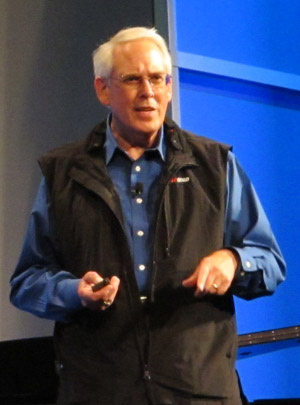 Living a quantified life -- tracking vital signs, recording exercise routines, monitoring caloric intake and counting steps -- is a large and growing trend important to wireless health and fitness. Figuring out where that data goes, who analyzes it and whether it should become part of a health record, whether consumer-facing, clinician-facing or both, is an ongoing struggle. Are we in danger of overwhelming our caretakers and physicians with data? Perhaps, if it's not analyzed and packaged in an actionable way.
Living a quantified life -- tracking vital signs, recording exercise routines, monitoring caloric intake and counting steps -- is a large and growing trend important to wireless health and fitness. Figuring out where that data goes, who analyzes it and whether it should become part of a health record, whether consumer-facing, clinician-facing or both, is an ongoing struggle. Are we in danger of overwhelming our caretakers and physicians with data? Perhaps, if it's not analyzed and packaged in an actionable way.
At the TED MED conference here in San Diego this week, one presenter made the case for including more data into electronic health records. More patient data needs to be available to physicians for review during patient visits. Was the case made for vital sign tracking? Pedomter metrics? Calories eaten? Nope.
Bill Davenhall, who leads the health and human services marketing team at ESRI, made the case that adding environmental data to patients' charts -- places the patients lived, types of chemicals and particulates found in those locations' air. Davenhall's case rested on the hypothesis that living in some environments may predispose a person to certain diseases, so having a conversation about geography should be a part of a patient's visit with their physician.
A friend of Davenhall's allowed his location to be tracked every day for two years via his cell phone. Davenhall compiled the data and mapped his friends locations against those location's environmental data -- much of which is tracked by the National Institutes of Health. Davenhall noted that the government is tracking this data already -- why isn't is finding its way into our health conversations? Davenhall also believes that the mobile phone is the best place to track and monitor location for patients. He showed off a demo smartphone app that included air quality information as it might appear in an electronic health record.
Davenhall's goal is obviously ambitious and forward-looking, but it seems like there's a long road ahead for incorporating this kind of data into the patient-doctor relationship any time soon.
Here's how Davenhall's TED MED biography describes his current work: His "newest mission is creating intelligent geographic solutions and technologies that would help physicians improve their diagnostic capabilities by receiving geographically and environmentally relevant information at the time of a patient consultation."
UPDATE: The Huffington Post's Alana Kornfeld has an extensive write-up on Davenhall's presentation -- be sure to check it out for more details from the event.













